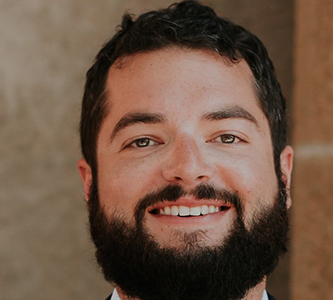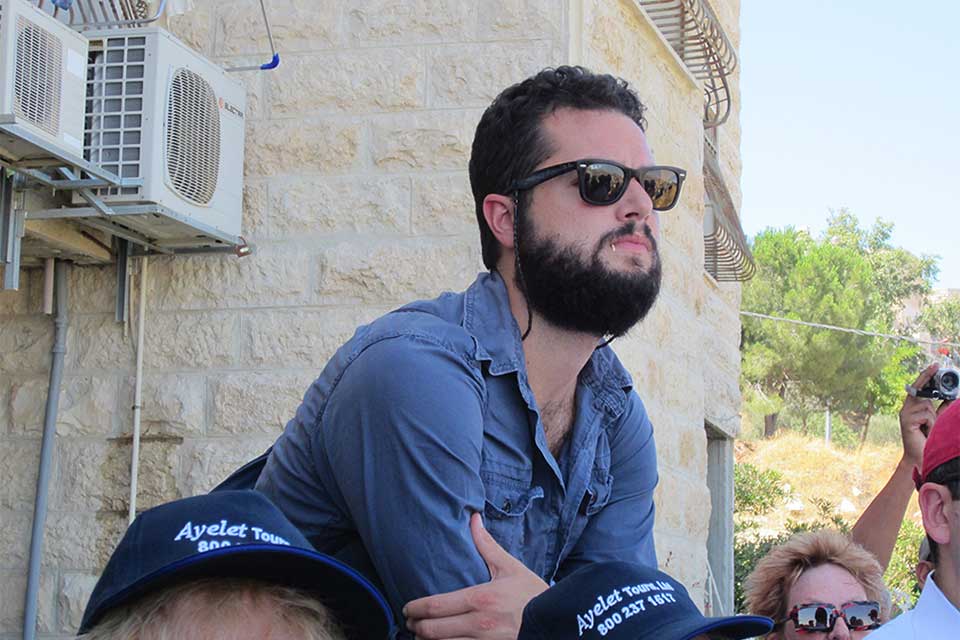Why do American evangelicals love Israel?
Reflections by Schusterman Center post-doctoral associate Walker Robins on his research April 2, 2018
April 2, 2018
It has been a fortuitous time to land at the Schusterman Center. President Trump’s December announcement that he would recognize Jerusalem as Israel’s capital—arguably the biggest Israel story of 2017—came during the last week of my fall course, “Jerusalem: Holy and Contested”, the very day after our class session on Jerusalem’s contested status in Israeli-Palestinian peace negotiations. The President’s decision also came largely at the behest of his evangelical Christian supporters, which meant that it offered a serendipitous segue to my spring course, “Christians and Israel.” Students who are curious about why American evangelicals celebrated President Trump’s decision—or why church leaders in Jerusalem condemned it—are now exploring these questions in my class on different Christian groups’ engagement with the idea and reality of a Jewish state. Aside from its sudden topicality, I am particularly excited to offer this course at Brandeis, since I first developed it as a fellow in the 2014 Summer Institute for Israel Studies at Brandeis.
My own research has long been focused on American Christians’ attitudes toward Israel. My doctoral dissertation, “Between Dixie and Zion: Southern Baptists’ Palestine Questions,” examined the roots of American evangelical support for Israel through a look at the United States’ largest Protestant denomination, the Southern Baptist Convention, in the decades leading up to the establishment of the Jewish state. While Southern Baptists have become strong supporters of Israel in recent decades, they displayed a much more varied attitude towards Zionism and the “Palestine question” prior to 1948. Most did not engage the Palestine question as a political question at all, instead forming their own “Palestine questions” that were shaped by the various ways in which they encountered the Holy Land. A foreign missionary raised different questions than an editorialist, a traveling Missourian than a Safed native, a Jewish convert and missionary than the President of the United States (yes, Harry Truman, the first foreign leader to recognize the government of Israel, was a Southern Baptist). While Southern Baptists had much to say about Palestine and even about Zionism, few felt the need to take political sides in the conflict at the time.

So how did Southern Baptists end up being so supportive of Israel? Already between the 1920s and 1940s, increasing numbers of Baptists were adopting premillennialist interpretations of the Bible that affirmed the Jewish people’s covenantal rights to the land of Israel and anticipated their restoration in concert with the Second Coming of Christ (premillennialists believe that Christ will return to establish a thousand-year reign on earth). Many—though not all—of these premillennialists were supportive of the Zionist cause. Some, like Southern Baptist missionary Jacob Gartenhaus, even argued “to oppose it is to oppose God’s plan.”
Southern Baptists broadly viewed Palestine through orientalist eyes, associating the Zionist movement with Western civilization, modernity, and progress over and against Palestine’s Arabs, whom they viewed as uncivilized, premodern, and backward. This view was shared by Baptist travelers, by missionaries, by premillennialists and by their opponents. It was shared by those who supported the Zionist movement on prophetic grounds and those who decried it on humanitarian grounds. This orientalist framing of the conflict did not necessarily point to political support for Zionism, but it did provide Southern Baptist supporters of the movement a second, orientalist “language”—supplementing the language of the Bible—that they could draw on in making their appeals to other Baptists.
My time at the Schusterman Center has allowed me to complete the conversion of my dissertation, “Between Dixie and Zion,” into a book manuscript and to begin work on my next project—a study of the interfaith alliances that shaped American liberal Christian opposition to Zionism in the early twentieth century. This project was inspired by the curious fact that many of the American Jewish leaders who were most involved in building relationships with Christians were also opposed to the establishment of a Jewish state. Their interfaith connections were often crucial in shaping Christian anti-Zionist thought and activism.
Cultural Zionist Judah Magnes’s role in guiding how leading American liberal Protestants thought about Zionism (a topic I presented on at the 2017 AIS Conference) offers one example. Cultural Zionists like Magnes sought the creation of a Jewish cultural center in the land of Israel that would invigorate Jewish life in the modern world. This did not necessarily require a Jewish state, though most hoped it would lead to one. Magnes himself favored the creation of a binational state in Palestine wherein Jews and Arabs would share power. As I argue in a recent essay in Israel Studies, American liberal Protestants like Harry Emerson Fosdick, William Ernest Hocking, and John Haynes Holmes found his vision inspiring, believing it could preserve all that was best in Zionism while avoiding the potential pitfalls of creating a Jewish state. When Magnes died in 1948, many Protestant leaders mourned him as a prophet.
As President Trump’s December announcement on Jerusalem showed, the American Christian relationship with Israel is more than a matter of idle curiosity—it is a matter of real consequence. Understanding that relationship helps us gain a fuller understanding of Israel’s past and ever-moving present.
Walker Robins is the 2017-18 post-doctoral associate in the Schusterman Center for Israel Studies at Brandeis University.